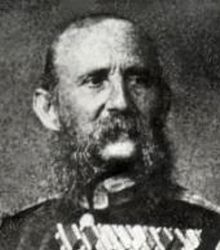Johann Gottfried Piefke
Johann Gottfried Piefke (born September 9, 1815 in Schwerin an der Warthe , † January 25, 1884 in Frankfurt (Oder) ) was a Prussian military musician and composer .
He achieved a certain prominence during his lifetime and possibly inspired the Austrians to use the nickname Piefke for all Germans, but in any case contributed to its spread.
life and work

Piefke was born in 1815 as the son of the organist and town musician Johann and his wife Dorothea. On May 1, 1835, he began his military service as an oboist with the Leibgrenadier Regiment No. 8 in Frankfurt (Oder). On September 1, 1838, he went to the University of Music in Berlin . There he had a liaison with the Princess von Trachenberg . As a staff member he returned to his regiment at III on June 1, 1843. Army Corps back. Piefke came to Berlin in 1852 together with parts of his regiment, later also called "Brezelgarde" by the Berliners. There he developed his talent as a musician; Both the professional world and his audience recognized him for this. On June 23, 1859 he was awarded the title of Royal Music Director and six years later, on March 20, 1865, he was given the title of Director of the entire music choirs of the III. Army Corps by William I. conferred.
By 1860 Piefke had returned to Frankfurt due to military requirements. Here he married a daughter of the Frankfurt food dealer Johann Carl Hankewitz. In 1864 he took part in the war against Denmark. When storming the Düppeler Schanzen he is said to have given the signal to attack with his sword directing.
In 1866 he took part in the war against Austria . On July 31, 1866, a large parade took place on the Marchfeld near Gänserndorf about 20 kilometers northeast of Vienna . When entering the city, both Johann Gottfried Piefke and his 1.90 m big brother Rudolf (1835-1900) marched at the head of the music corps. In response, the Viennese are said to have exclaimed “Die Piefkes are coming!”, Which later became the Austrian national team name for the German i. A. was. However, this connection has not been proven.
During the Franco-Prussian War in 1870/71, Piefke fell ill during the siege of Metz ; he could not return to his unit until 1871. After the end of the war, Piefke devoted himself more to classical music. He gave numerous concerts in Frankfurt and made concert tours.
Gottfried Piefke died on January 25, 1884 at the age of 68. Three days later he was buried with military honors in the old cemetery, today Kleistpark Frankfurt (Oder) . The grave site has not been preserved.
In Gänserndorf , where Piefke and his brother Rudolf had conducted a music corps in July 1866, a monument was erected in September 2009 with a “sound sculpture made of Corten steel ”.

Works
In addition to military music, he devoted himself to arrangements of classical pieces and organized concerts. But he was best known for the numerous marches he composed. The most famous are the March of Prussia Gloria , the Düppeler Schanzen-March and the Königgrätzer March .
Other works: Pochhammer March, Victory March, Gitana March, Margarethen March, Kaiser Wilhelm Victory March and Der Alsenströmer.
Awards
- Düppeler Sturmkreuz , 1864
- Golden medal of the Emperor of Austria-Hungary, 1865
- Royal House Order of Hohenzollern on January 18, 1869
- Iron Cross (1870) 2nd class
- Prussian Crown Order IV Class, 1880
literature
- Joachim Schneider: Gottfried von Frankfurt a. O. In: Communications from the historical association of Frankfurt (Oder) eV , 1st issue 1993, pp. 7-13
- Martin Sprungala: Johann Gottfried Piefke (1815–1884). In: Poznan Voices , No. 4, April 2006, Lüneburg, in the supplement Posener Blätter
Web links
- Works by and about Johann Gottfried Piefke in the catalog of the German National Library
- Works by and about Johann Gottfried Piefke in the German Digital Library
- Biography of Piefkes
Individual evidence
- ^ A monument to Piefke In: Frankfurter Allgemeine Zeitung online from September 15, 2009
- ^ Piefke memorial in Gänserndorf
| personal data | |
|---|---|
| SURNAME | Piefke, Johann Gottfried |
| BRIEF DESCRIPTION | Prussian military musician and composer |
| DATE OF BIRTH | September 9, 1815 |
| PLACE OF BIRTH | Schwerin on the Warta |
| DATE OF DEATH | January 25, 1884 |
| Place of death | Frankfurt (Oder) |


